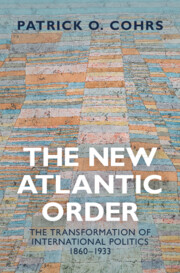Book contents
- The New Atlantic Order
- The New Atlantic Order
- Copyright page
- Dedication
- Contents
- Acknowledgements
- Abbreviations
- Maps
- Introduction
- Part I Inevitable Descent into the Abyss?
- 1 Peace Through Equilibrium
- 2 Transformation and Corrosion
- 3 The “Ascent” of an Exceptionalist World Power
- 4 Counterforces – and First Visions of a Novel Transatlantic Peace
- 5 The Unavoidable War?
- Part II The Greatest War – and No Peace without Victory
- Part III Reorientations and Incipient Learning Processes
- Part IV No Pax Atlantica
- Epilogue The Political Consequences of the Peace
- Bibliography
- Index
5 - The Unavoidable War?
Long and Short Roads to the Catastrophe of 1914
from Part I - Inevitable Descent into the Abyss?
Published online by Cambridge University Press: 22 April 2022
- The New Atlantic Order
- The New Atlantic Order
- Copyright page
- Dedication
- Contents
- Acknowledgements
- Abbreviations
- Maps
- Introduction
- Part I Inevitable Descent into the Abyss?
- 1 Peace Through Equilibrium
- 2 Transformation and Corrosion
- 3 The “Ascent” of an Exceptionalist World Power
- 4 Counterforces – and First Visions of a Novel Transatlantic Peace
- 5 The Unavoidable War?
- Part II The Greatest War – and No Peace without Victory
- Part III Reorientations and Incipient Learning Processes
- Part IV No Pax Atlantica
- Epilogue The Political Consequences of the Peace
- Bibliography
- Index
Summary
Chapter 5 illuminates systematically – in a European, transatlantic and global context – not only the prehistory of the July crisis of 1914 but also the decisive longer-term changes in the international system and ground-rules and assumptions of international politics that led to the outbreak of the Great War. Challenging long-standing interpretations as well as the recently influential notion that European leaders acted like “sleepwalkers”, it underscores that what really proved decisive were two crucial developments: on one level, the final demise of the European concert as a key mechanism for peaceful conflict-resolution and the emergence of two antagonistic alliance blocs; and, on a more fundamental level, processes that led those who made the key decisions in and before 1914 to “unlearn” what was required, not merely to defuse continual crises at the eleventh hour but actually to manage the core systemic challenges of the age of imperialism and preserve peace more effectively. It thus seeks to show in a new way why by 1914 the escalation of a general conflict, which then widened into the First World War, had become all but unavoidable.
Keywords
- Type
- Chapter
- Information
- The New Atlantic OrderThe Transformation of International Politics, 1860–1933, pp. 138 - 168Publisher: Cambridge University PressPrint publication year: 2022

